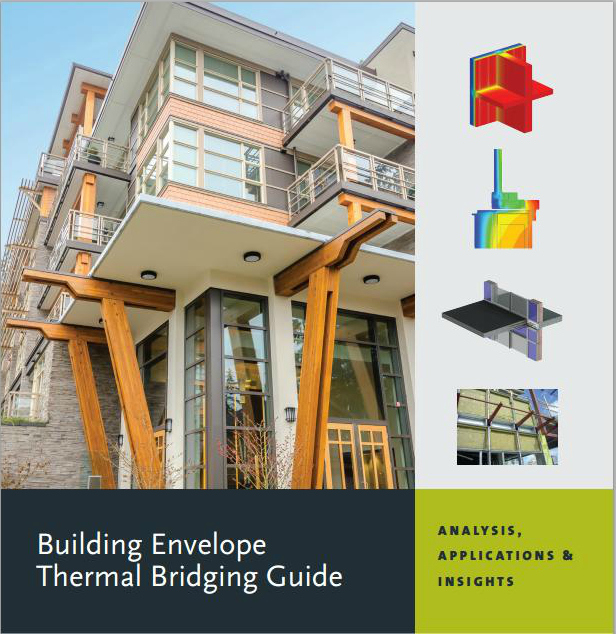Morrison Hershfield has announced that the Building Envelope Thermal Bridging Guide – Analysis, Applications, and Insights is now public and can be downloaded from BC Hydro. The guide aims to overcome obstacles confronting the industry with respect to mitigating thermal bridging to reduce energy consumption in buildings.
The guide was developed by Morrison Hershfield in collaboration with co-sponsors and industry partners. Co-sponsors include BC Hydro Power Smart, Canadian Wood Council, Fortis BC, FPInnovations, and Homeowner Protection Office. Industry partners helped extend the scope of the guide to include many additional details.
The principle goal of these collaborating organizations is to promote energy-efficiency in buildings by increasing awareness of the impact of and methods to mitigate thermal bridging. To meet these goals, the guide addresses a number of obstacles currently confronting our industry by:
-
Cataloging the thermal performance of common building envelope assemblies and interface details.
-
Providing data-driven guidance that will make it easier for the industry to comprehensively consider thermal bridging in building codes and bylaws, design, and whole building energy simulations.
-
Examining the costs associated with improving the thermal performance of opaque building envelope assemblies and interface details, and forecasting the energy impact for several building types and climates.
-
Evaluating the cost effectiveness of improving the building envelope through more thermally efficient assemblies, interface details, and varying insulation levels.
-
The guide, which is broken into three main sections for ease of use, contains helpful information for technical committees for energy standards, regulators, utilities, architects, mechanical designers, building envelope consultants, energy modellers, developers, manufacturers and trade organizations.
The guide outlines how to effectively account for thermal bridging and is backed up by an extensive catalogue of thermal performance data. This information is essential for practitioners evaluating building envelope thermal performance.
Researchers and regulators will be interested in the sections focused on market transformation, which includes an evaluation of cost effectiveness and energy savings in common large building types.
Related Stories
Office Buildings | May 20, 2024
10 spaces that are no longer optional to create a great workplace
Amenities are no longer optional. The new role of the office is not only a place to get work done, but to provide a mix of work experiences for employees.
Mass Timber | May 17, 2024
Charlotte's new multifamily mid-rise will feature exposed mass timber
Construction recently kicked off for Oxbow, a multifamily community in Charlotte’s The Mill District. The $97.8 million project, consisting of 389 rental units and 14,300 sf of commercial space, sits on 4.3 acres that formerly housed four commercial buildings. The street-level retail is designed for boutiques, coffee shops, and other neighborhood services.
Construction Costs | May 16, 2024
New download: BD+C's May 2024 Market Intelligence Report
Building Design+Construction's monthly Market Intelligence Report offers a snapshot of the health of the U.S. building construction industry, including the commercial, multifamily, institutional, and industrial building sectors. This report tracks the latest metrics related to construction spending, demand for design services, contractor backlogs, and material price trends.
K-12 Schools | May 15, 2024
A new Alabama high school supports hands-on, collaborative, and diverse learning
In Gulf Shores, a city on Alabama’s Gulf Coast, a new $137 million high school broke ground in late April and is expected to open in the fall of 2026. Designed by DLR Group and Goodwyn Mills Cawood, the 287,000-sf Gulf Shores High School will offer cutting-edge facilities and hands-on learning opportunities.
Adaptive Reuse | May 15, 2024
Modular adaptive reuse of parking structure grants future flexibility
The shift away from excessive parking requirements aligns with a broader movement, encouraging development of more sustainable and affordable housing.
Affordable Housing | May 14, 2024
Brooklyn's colorful new affordable housing project includes retail, public spaces
A new affordable housing development located in the fastest growing section of Brooklyn, N.Y., where over half the population lives below the poverty line, transformed a long vacant lot into a community asset. The Van Sinderen Plaza project consists of a newly constructed pair of seven-story buildings totaling 193,665 sf, including 130 affordable units.
K-12 Schools | May 13, 2024
S.M.A.R.T. campus combines 3 schools on one site
From the start of the design process for Santa Clara Unified School District’s new preK-12 campus, discussions moved beyond brick-and-mortar to focus on envisioning the future of education in Silicon Valley.
University Buildings | May 10, 2024
UNC Chapel Hill’s new medical education building offers seminar rooms and midsize classrooms—and notably, no lecture halls
The University of North Carolina at Chapel Hill has unveiled a new medical education building, Roper Hall. Designed by The S/L/A/M Collaborative (SLAM) and Flad Architects, the UNC School of Medicine’s new building intends to train new generations of physicians through dynamic and active modes of learning.
Sustainability | May 10, 2024
Perkins&Will’s first ESG report discloses operational performance data across key metrics
Perkins&Will recently released its first ESG report that discloses the firm’s operational performance data across key metrics and assesses its strengths and opportunities.
MFPRO+ News | May 10, 2024
HUD strengthens flood protection rules for new and rebuilt residential buildings
The U.S. Department of Housing and Urban Development (HUD) issued more stringent flood protection requirements for new and rebuilt homes that are developed with, or financed with, federal funds. The rule strengthens standards by increasing elevations and flood-proofing requirements of new properties in areas at risk of flooding.

















